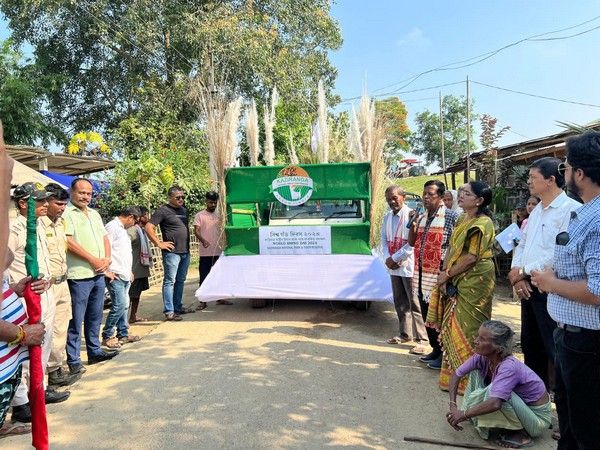Guwahati (Assam) [India], September 22 (ANI): The World Rhino Day celebration was held on Sunday at Kaziranga National Park and Tiger Reserve, featuring a series of outreach activities aimed at raising public awareness about rhino conservation.
These initiatives were designed to engage the community and highlight the importance of protecting the one-horned rhino, a species synonymous with Kaziranga and Assam's biodiversity.
Today on World Rhino Day, Prime Minister Narendra Modi in a post on X, expressed his commitment to protecting rhinos, one of the planet's most iconic species.
He commended those involved in rhino conservation efforts over the years and highlighted India's pride in being home to a large population of one-horned rhinos, primarily in Assam's Kaziranga National Park. He fondly recalled his own visit to Kaziranga and encouraged others to visit the park as well.
On this occasion, Chief Minister of Assam, Himanta Biswa Sarma, through his social media post, called rhinos the "pride and crown jewel" of the state's biodiversity.
CM Sarma highlighted the various initiatives taken by his government since assuming office to protect the one-horned rhinos, expand their habitat, and ensure their safety.
To mark this occasion series of events were organized at Kohora Convention Centre, Kaziranga which included Conservation Rally, Jungle Safari Skill Upgradation Training and Unique Salary account 'Project Van Rakshak' Axis bank Scheme for Forest Frontline workers.
Atul Bora, Minister for Agriculture, Animal Husbandry & Veterinary Govt. of Assam; Keshab Mahanta, Minister for Transport, Science Technology & Climate Change, Government of Assam & Kamakhya Prasad Tasa, Member of Parliament, Kaziranga Lok Sabha Constituency presided over the central function as the Chief Guests.
The day commenced with a Rhino Tableau Rally aimed at promoting the importance of rhino conservation, drawing participation from local communities, gypsy safari associations, forest staff, NGOs and wildlife enthusiasts.
This year, a unique program aimed at providing refresher training to about 700 Gypsy safari drivers and mahouts on visitor safety and enhancement of visitor experience has been planned with funding support from Assam Skill Development Mission.
The training has focused on improving wildlife interpretation and visitor interaction, fostering a better understanding of conservation efforts among tourists.
The first two batches were completed successfully and the participants were handed over certificates, badges, uniform and I-card by the chief guests in the function.
At the event, two books that showcase the rich biodiversity of Assam namely "Birds of Assam" a guidebook by septuagenarian author and naturalist Santa Sarma, and "A Handbook on Common Freshwater Fishes of Assam" - a joint publication by Assam State Wetland Authority and the Indo-German Bilateral Cooperation Project were released.
Apart from this a voluntary salary account linked - the Health Insurance Scheme for Forest Frontline Workers was launched by Axis Bank. This initiative aims to support and safeguard the health of forest personnel who are at the forefront of wildlife protection.
Assam is collectively home to 80 percent of the global population of greater one-horned rhinos. This conservation success story is the result of relentless efforts by the forest department and local communities.
The rhino population has surged by approximately 170 percent since the 1980s, growing from 1,500 to over 4,014 today.
Assam stands at the forefront of rhino conservation in India, a position it has held for over a century through the dedication and sacrifice of its forest frontlines and the support of local communities.
The state's commitment to safeguarding the iconic greater one-horned rhinoceros (Rhinoceros unicornis) has become a symbol of pride and resilience.
By maintaining a rhino-centric approach, Assam continues to be a global leader in wildlife conservation.
Prime Minister Narendra Modi's visit with forest guards (Van Durgas) during his first-ever visit to Kaziranga National Park, and his engagement in elephant rides and conservation efforts creates enthusiasm and awareness among the common folks.
An expansion of over 200 sq km in Orang National Park and the reclaiming of 12.82 sq km in Laokhowa-Burachapori Wildlife Sanctuary, emphasizes habitat growth for rhinos.
Newly declared protected areas, such as Siknajhar National Park and Poba Wildlife Sanctuary, show Assam's commitment to securing habitats for rhinos and other wildlife.
Historic burning of 2,479 rhino horns to symbolize Assam's zero-tolerance policy towards poaching.
A number of legal measures have been taken for Rhino protection both pre and post-independence. These measures include the Assam Forest Protection Act of 1891 and the Bengal Rhinoceros Preservation Act of 1932, which prohibited the killing, injuring, or capturing of rhinos, except in self-defense or under license.
After independence, the Assam Rhino Protection Act of 1954 reinforced these protections. Further, the Wildlife (Protection) Act of 1972 and its Assam amendment in 2009 increased penalties for poaching, introducing harsher sentences, including life imprisonment for repeat offenders, and higher fines to deter illegal activities.
The Indian Rhino Vision 2005 program also bolstered conservation efforts.
Kaziranga National Park, with 2,613 rhinos as of 2022, is a global model for rhino conservation. Strict protection measures, smart patrolling, and community engagement have contributed to its success. Additionally, partnerships between the park authorities and local communities have mitigated human-wildlife conflicts, further strengthening conservation efforts.
Kaziranga is not only a conservation success story but also a prime destination for eco-tourism, attracting wildlife enthusiasts and photographers from around the world. Revenue from tourism is reinvested in conservation, ensuring the long-term protection of rhinos and other wildlife. Assam's Kaziranga stands as a symbol of India's leadership in wildlife conservation and coexistence with nature. (ANI)








